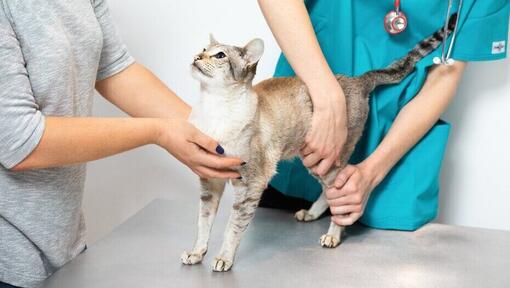
The most common worms in cats are roundworms and tapeworms. Neither of them are good for your cat – they can cause everything from lethargy to a change in bowel habits, as well as weight loss and other symptoms.
Luckily, it’s easy to keep an eye out for the symptoms of worms in cats. If you know the most common signs, you can take your cat to the vet for treatment in good time.
What are cat worms and how can my cat catch them?
Roundworms (Toxocara cati and Toxascaris leonina) are the most common intestinal parasites in kittens and cats. They are long, white and look like spaghetti. Eggs from these cat worms are passed in the faeces and can live for months or years in the soil. Cats can become infected in three main ways:
- Ingestion of eggs directly from contaminated soil e.g. by licking them off their feet
- Consumption of a rodent who has previously eaten worm eggs from the environment
- Ingestion by kittens of worm larvae in their mother’s milk (Toxocara cati only). The vast majority of new-born kittens are infected with roundworms by this route.
Another type of cat worms your cat could be infected by are Tapeworms (Dipylidium caninum and Taenia taeniaeformis). Tapeworms are long, flat and composed of many segments which contain eggs. The segments are regularly shed in faeces and resemble grains of rice which can sometimes be seen crawling around a cat’s anus or on their bed.
To complete their lifecycle, tapeworms require an intermediate host to eat their eggs from the environment. Cats then become infected by consuming the intermediate host. Intermediate hosts include fleas and rodents. For this reason, if your cat is diagnosed with fleas, they will probably need treatment for tapeworms and vice versa. In addition, if they hunt and eats rodents, they will also require tapeworm treatment. You can find out more about tapeworms in cats with our easy guide.
What are the most common symptoms of worms in cats?
Weight loss and a distended stomach
Cats who have worms often still have a good appetite, but you may notice that despite eating a normal amount, they are losing weight. If your cat is losing weight for any reason it’s time for a trip to the vet, but if it is accompanied by a ‘distended’ stomach – i.e. a stomach that looks bloated – it may be a symptom of worms.
Coarse fur
Another symptom of worms in cats is a change in their fur condition. Their fur may become coarse and rough, and lack its usual lustre. This is particularly a symptom of worms if it is accompanied by a distended stomach.
Cats with worms may experience a change in bowel habits, particularly the onset of diarrhoea. Whether the cause is worms or not, it’s important to take your cat to see the vet if they experience this.
Visible traces of worms
You may find that worms, or parts of worms, are visible in your cat’s stool. They may also be visible around their anus, or possibly in their bedding.
Worms can be a variety of sizes; the most common worm, roundworm, can grow up to 10cm long (although you are unlikely to see one this big). Worms are usually white. Look out for whole worms, or sections of their bodies. Tapeworm sections look like small white ‘grains.
Unusual behaviour
Any kind of unusual behaviour in your cat requires further investigation, but there are two things that may be indicative of worms:
- Lethargy – Cats with worms are often lethargic. They may lack energy, or seem to have less interest in things that usually excite them.
- Dragging themselves along the carpet – This is a strong symptom of cat worms. When cats drag their bottoms along the carpet, it may be because worms are irritating them.
Preventing cat worms is better than curing them
Remember, preventing cat worms is better than having to treat them. Your cat should be regularly wormed to prevent them from being infected. Follow the advice from your vet to find the most suitable preventative method for your cat, and how often you should treat them.
Kittens can have monthly preventative treatment against tapeworms from six weeks of age, and every three months from six months of age. Adults can have this treatment every two to six months. Your vet will be able to tell your more.
Your cat may also contract worms by swallowing a flea, as some fleas may carry worms. For this reason, preventing fleas is also important. Find out more about fleas in cats in our article.
Treating cat worms
There are many types of treatments available if your cat has worms. Your vet will be able to tell you which treatment is the most suitable for your cat. If you notice any symptoms of worms in your cat, it is important to get an appointment with your vet as soon as possible.
How to worm a cat or kitten
Deworming cats is simple as worming treatments are now available as liquids, pastes, granules and palatable worming tablets as well as liquid ‘spot on’ formulations so you can choose the easiest one for your cat. Follow the on-pack instructions in full and stick to the advised schedule for your chosen product.
Because roundworms are so common in kittens it is vital to begin treatment from an early age. It is recommended that kittens are treated for roundworms every two weeks from two until eight weeks of age, then monthly until six months of age and every one to three months thereafter. Kittens only require tapeworm treatment if they also have fleas.
Adult cats should be treated every 1 to 3 months with a product which is effective against both roundworms and tapeworms.
Cat worms and human health
Feline roundworms can pose a risk to human health. Contact with cat faeces or contaminated soil can result in human ingestion and infection. Children should not be allowed to play where cats pass faeces and children’s sand pits should be covered when they are not in use to avoid cats defecating in them. It is also advised that gardeners wear gloves to avoid contamination and litter boxes are cleaned out every day.
Worming your cat is simple, and following a regular cat worming programme will not only help keep your cat healthy but also helps prevent human infections too!
Next, find out more about other parasites in cats, including cat ticks and what you can do to keep them at bay.













